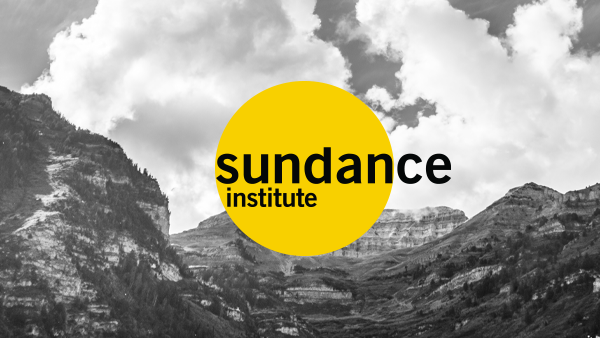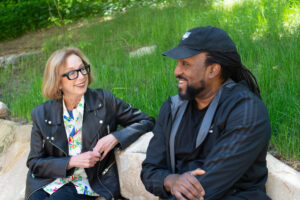Faiza Saleh Ambah
Based in Jiddah, Saudi Arabia, Faiza Saleh Ambah is a Saudi filmmaker with a background in journalism. She left her job as Gulf Correspondent for The Washington Post in 2009 to focus on filmmaking and recently completed a summer program at the USC School of Cinematic Arts. Faiza documented her experience at Sundance Institute’s RAWI Screenwriters Lab in Jordan this fall where, along with other Middle Eastern screenwriters, she honed her storytelling skills under the guidance of Creative Advisors.
Wednesday October 29—The first time I meet everyone is over dinner in the garden of the beautiful limestone headquarters of the Jordan Royal Film Commission. All the Fellows, including Arab screenwriters living around the world, are excited to be here. For three years I have written in the cultural desert of Saudi Arabia, plugging away at my computer, work-shopping draft after draft in online courses based in New York and Los Angeles. I was never able to sit with screenwriters to shoot the breeze about our stories, discuss how our characters were coming along, or determine the best way to move our plots forward.
Getting to know writers who want to make films with international appeal is a singular delight—they are my screenwriting soul mates, In Saudi Arabia there are no writing groups, no film schools, and no film industry. And even if there were, there is no place to showcase work because film festivals and cinemas are banned in the conservative kingdom.
Later on in the evening the Advisors arrive and I am unsettled by the presence of personal heroes like Bernd Lichtenberg (Good Bye, Lenin!) and Jose Rivera(Motorcycle Diaries). I shake hands and try not to stare or make a fool of myself.
Thursday Oct. 28 — The three-hour bus ride to the lodge where we will be staying gives us a chance to get better acquainted. The Fellows ask about each other’s screenplays and promise to read each other’s work. Every single one of them is passionate, interesting, and talented and I get a heady sense of camaraderie. After years of feeling like a stranger in the Arab world, Europe, and the United States, I think I may have found my lost tribe.
We then embark on a bumpy trek across the desert to our eco-lodge in Wadi Feynan in southern Jordan.
Friday Oct. 29—My first session is with Richard Glatzer, cowriter and director of Quinceanera. Given the current climate of fear in the United States I am nervous about how my American Advisors will digest my script, A Reverence For Spiders, a story about a headstrong imam, Omar Metwally, and his daughter, Mariam.
I had written a film with a central character that a Western audience would be primed to dislike, or at least mistrust. I wanted the viewer to slowly see the story through Omar’s eyes and fully inhabit his humanity.
It was easy to distance myself from the realities while I was writing alone in my living room in Jiddah, but facing my potential audience was a little unnerving.
Richard, who is Jewish and gay, was able to empathize with my conservative imam character, and his reaction restored my faith in the power of storytelling.
Sunday Oct. 31—My session today is with another hero of mine, Ziad Doueri, who wrote and directed West Beirut, the first Arabic movie to have international appeal. When it came out in 1998 it was a revelation and a source of great pride to see a fellow Arab make a film that Westerners wanted to see. Despite my admiration I am a bit nervous about my session with Ziad, an intense wiry man with curly locks almost to his shoulders. Over the past couple of days during his sessions with Fellows in the courtyard, I have seen him stand up, walk around, gesture animatedly, and pepper his speech with swear words in Arabic, English, and French. The Fellows all love him because he treats their projects as if they were his own. I have the sense that he feels somewhat responsible for Arab cinema, as if its future rested on his shoulders.
That afternoon my session is with Jose Rivera, a modest, sweet, and extremely articulate man who treats us like fellow writers, not wannabes. He tells me he enjoyed my script and as he pages through it I see the word ‘nice’ written in the margins several times. As he discusses my character Omar’s relationship with his wife and daughters, I have a surreal moment. For a few seconds I don’t follow what he says because I am acutely aware of the fact that Jose Rivera is discussing my screenplay with me, Faiza Ambah, like it’s the most natural thing in the world.
At the end of the session I ask Jose if I can keep his copy of my script with his notes on it. I want tangible proof that this moment was real.
Monday November 1—It’s the official end of the Lab. I fight panic. I ask to speak in private with Sundance Institute organizer Alesia Weston and JRFC organizer Reem Bader. This can’t end. I’m not ready to go back to Saudi Arabia. After three years on my own in the film wasteland that is Saudi Arabia I am terrified of being set adrift again.
They explain patiently that their relationship with me does not end when the Lab ends. They will remain in touch, alerting me and other fellows to grants and development funds and other opportunities that come up. They will continue to work with us to develop our scripts.
“We are a family now,” says Reem. I calm myself down long enough to understand that what they’re telling me. This is not a one-night stand. This is not a fling. This is a marriage. I am ready to leave Wadi Feynan now.

2005 Rawi Alumns – Najwa Najjar, Cherien Dabis, Naji Abu Nowar – Return to participate in one-day additional module – “Carry on as a Filmmaker”
Wednesday November 3—We meet at the Jordan Film House again for a seminar. I search for a bathroom and stumble onto a film library, viewing cubicles, an editing room, screening room, and an equipment storage room. Mohannad al-Bakri, a manager at the Jordan Royal Film Commission, tells me all this is available to me and other fellows and alumni for free, including a residence studio and outdoor amphitheatre. Wow. I am grateful but can’t help but feel an ache inside as I look around at the shelved movies and film magazines and the bank of computers. I wish there was something similar in Saudi Arabia where aspiring filmmakers pool money together to buy equipment, drive 500 kilometers to neighboring Bahrain to watch movies, and camp out four and five to a room to attend film festivals in neighboring countries.
At the “Carry On as a Filmmaker” seminar I meet another role model, RAWI alumni Cherin Dabis, writer and director of Amreeka. With the admonition from Alesia that there are no dumb questions, I fire away, feeling safe enough to expose my ignorance. The panel of producers and RAWI alumni explain patiently what script development funds are, what producers do, and discuss various sources of film funding. One panelist suggests we find our own film funds and retain more control over our projects. Another advises us not to sign with the first person who asks but with the most compatible person. I realize that over the past week I had started to shed the feeling that being a Saudi screenwriter was an oxymoron.
The next day I get on the plane to Saudi Arabia. I drape on the black abaya cloak mandated by local culture. But underneath I am not the same person I was when I arrived last week. I am a filmmaker.




